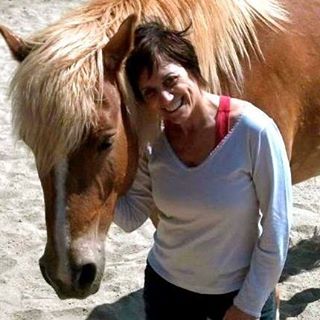What led you to Equus Coaching?
I have always loved horses, so I was thrilled when I learned I could integrate them into my work. I am a Bioenergetic Therapist (Somatic Relational Therapy) and an Imago Relationship Therapist, so I am used to working with energy and relationships. It was a natural fit since those two things are the foundation of Equus Coaching.
How would you describe Equus Coaching for couples and families? Who should try it?
I think we can all do a better job of relating to those around us, especially those closest to us. I have heard couples and families referring to their Equus sessions for years after their experience because it has made such a difference in their relationships.

Harville Hendrix, the creator of Imago, says the most dangerous thing couples (families) do is talk to one another. They trigger one another into a disconnection when what they want more than anything is connection.
This may sound simple, but one of the most challenging premises for partners to reconcile is that they are different from one another. They have different histories, so they will always experience life events differently.
To truly understand your partner, you need to be fully present in their world and develop the capacity to deeply listen to their beliefs, reactions, and feelings. If you try to understand their point of view through your own world view, your partner will not make sense, and consequently, they will not feel deeply known.
When people enter the world of Equus and experience the novelty of relating with a horse, they begin to ‘get’ how they have contributed to what works and what challenges their connection with their human partner.
Horses give immediate feedback when they feel safe or threatened by incongruencies or even minor aggressions. Because of that, humans can make micro-adjustments, experience the results of that behavior, and adjust until they achieve their desired outcome.
The observing partner can also develop empathy as they see these unconscious patterns revealed and adjusted.
Participants develop awareness about the ‘stories they tell themselves’ about what is happening and why. There is probably an unconscious history to their stories, so once it’s made conscious, they can see how it may also be affecting their human relationships and make decisions about it.
Can horses help heal relationships?
I have combined Equus Coaching with Imago Relationship Therapy and offered a three-day workshop to couples. I start with an Equus Day, then teach Imago theory and communication skills. Couples often comment about their Equus experience mirroring their long-term relationship struggles and how learning to relate with the horses contributed to their success in relating to their partner.
I have a traumatized mini named Buddha, who is terrified of people. Participants are usually so gentle with him because of that. During the workshop, I often remind them to approach their partner as if they were Buddha.
That is an image they remember for a long time.
What issues are commonly addressed in the pen?
Communication is a common issue for couples and families. I’ve also worked with life transitions, conflict resolution, parenting issues, traumas, infidelity, empty nests, and others.
That being said, there is no limit to what can be addressed in the pen. The horses respond to energetic congruence and discrepancies, so reflecting on their feedback helps participants become clearer about their issue.
What feedback or realizations have clients shared after an Equus Coaching session?
One couple told me they had gotten more out of a day with the horses than in the previous year of therapy.
A family learned how to talk to their teenage boys after they played horse billiards together. Another mom learned to stop chasing after her daughters and let them come to her after experiencing that dynamic with the herd.
When the horse walked away from her, another mom realized she was unconsciously telling herself a story about whether people liked her or not. She would quit the relationship or put pressure on the people in her life to go along with her beliefs. She decided she would do more listening.
A couple realized they had grown apart because of the stories they told themselves about each other. They practiced communicating their desires with the horse and realized they needed to be more forthcoming about what they needed with each other.
For couples/families/friends who can’t get outside enough or do the things they typically like to do right now, what advice do you have for maintaining healthy relationships during Covid-19? How have Covid-19 created opportunities to work on relationships with self and others?
Being quarantined together can take a toll on the best relationships. Getting outside is one thing people can do right now. So, getting some fresh air and moving muscles is really important; otherwise, we become stiff and rigid in our bodies, minds, and beliefs.
Laughing, playing, dancing, cooking, creating are ways couples and families can connect while having fun.
It’s also essential that everyone has their own time to be alone or connect with friends and family outside the immediate household.
Weekly check-ins can also clear the air and resolve conflicts before they become overwhelming. Genuinely listening and validating someone’s perspective can go a long way in keeping peace in a household. Allowing everyone to have a turn to speak their mind without interruption or disagreement can give them the sense they are important and what they say matters.
Anything else you’d like to share?
Living with horses has taught me to live in the present, take care of myself, take care of my herd, and pay attention to the world around me. It has also taught me to not take everything personally, and if someone is in a bad mood or wants to be alone, I can come back later. Finally, horses have taught me the value of resting and preserving energy. I don’t need to be doing something every minute. I can just hang out and be.